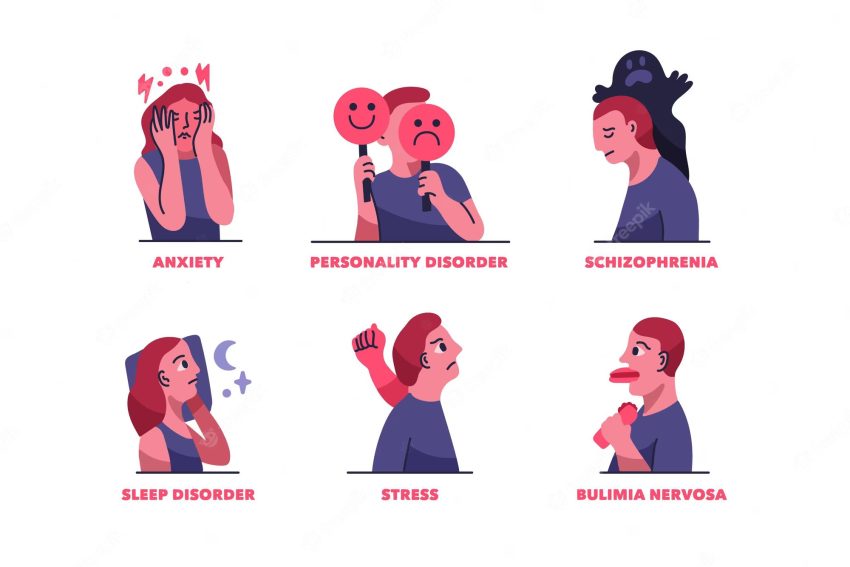Schizoid Personality Disorder is a mental health condition characterized by a pattern of detachment from social relationships and a restricted range of emotional expression in interpersonal settings. People with this disorder tend to prefer solitary activities and may have difficulty forming close relationships, as they tend to be emotionally detached and uninterested in socializing
Characteristics of Schizoid Personality Disorder
The pattern of emotional coldness and detachment in social interactions that characterize schizoid disorder is accompanied by a constrained spectrum of emotional expression. Some common characteristics of this disorder may include:
- Preference for solitude and limited social interactions
- Difficulty forming close relationships and lack of interest in romantic relationships
- Emotional detachment and flat affect (lack of emotional expression)
- Limited range of interests and activities
- 5. Ignorance of compliments or criticism from others
- Difficulty understanding social cues and expressing emotions
- Tendency to be absorbed in their own thoughts and fantasies
- Difficulty with communication and maintaining eye contact
- 9. Lack of interest in engaging in sexual activity with another individual
- Lack of pleasure in most activities
It is important to note that not all individuals with Schizoid Disorder will exhibit all of these characteristics and that the severity of symptoms can vary. Diagnosis and treatment should be conducted by a qualified mental health professional.
Seeking Help for Schizoid Personality Disorder
If you suspect that you or a loved one may have Schizoid Disorder, it is important to seek professional help from a mental health provider. The following actions are ones you can take:
Schedule an appointment with a mental health professional: A psychiatrist or psychologist can conduct an evaluation and determine if you meet the criteria for Schizoid Personality Disorder.
- Consider therapy: Psychotherapy can be helpful for individuals with Asocial Personality Disorder to improve social and communication skills, develop coping mechanisms, and explore their emotions. A therapist can help you identify your goals and develop a treatment plan.
- Explore medication options: While there is no specific medication for Asocial Personality Disorder, medications such as antidepressants and antipsychotics may be used to manage associated symptoms such as depression or anxiety.
- Consider support groups: Support groups can provide a safe space for individuals with Schizoid Personality Disorder to connect with others who are going through similar experiences.
Remember that seeking help is the first step towards managing symptoms and improving overall functioning. With the right support and treatment, individuals with Schizoid Personality Disorder can learn to navigate social situations and improve their quality of life.
Schizoid Personality Disorder Symptoms
The symptoms of Schizoid Personality Disorder include:
- Emotional detachment and lack of interest in social relationships
- Limited range of emotional expression
- Preference for solitary activities
- Difficulty forming close relationships
- Lack of desire for sexual experiences with another person
- Indifference to praise or criticism from others
- Lack of pleasure in most activities
- Difficulty understanding social cues and expressing emotions
- 9. Propensity for becoming lost in one’s own thoughts and imagination
- Difficulty with communication and maintaining eye contact
- Flat affect (lack of emotional expression)
It is important to note that not all individuals with psychoneurotic will exhibit all of these symptoms, and the severity of symptoms can vary. Additionally, some symptoms may overlap with other mental health conditions, so it is important to seek professional evaluation and diagnosis from a qualified mental health provider.
Causes and risk factor Schizoid Personality Disorder
The exact causes of unhinged are not entirely understood, although evidence points to a possible interaction between genetic, environmental, and psychological factors. Some of the potential causes and risk factors for developing Schizoid Personality Disorder include:
- Genetics: There may be a genetic component to Schizoid Personality Disorder, as the condition tends to run in families.
- Early childhood experiences: Traumatic experiences in childhood, such as neglect, abuse, or rejection, may contribute to the development of Schizoid Personality Disorder.
- Environmental factors: Living in an isolated or emotionally cold environment may increase the risk of developing crack-brained.
- Brain chemistry: There may be abnormalities in the brain chemistry of individuals with crackbrained, particularly in the areas of the brain that regulate emotions and social behavior.
- Personality traits: Certain personality traits, such as introversion and shyness, may increase the risk of developing Schizoid Personality Disorder.
It is important to note that not all individuals with these risk factors will develop Schizoid Personality Disorder, and some individuals may develop the disorder without any known risk factors. Additionally, a qualified mental health professional should conduct a thorough evaluation to diagnose Schizoid Personality Disorder.
conclusion
Schizoid Personality Disorder is a mental health condition characterized by emotional detachment, a limited range of emotional expression, and a preference for solitary activities. The exact causes of the disorder are not fully understood, but genetics, early childhood experiences, brain chemistry, and personality traits may all play a role.
TalktoAngel is one of the top internet sources for finding experts in emotional well-being. Using this search engine, enter search terms. “Online counselling OR Online counsellor

